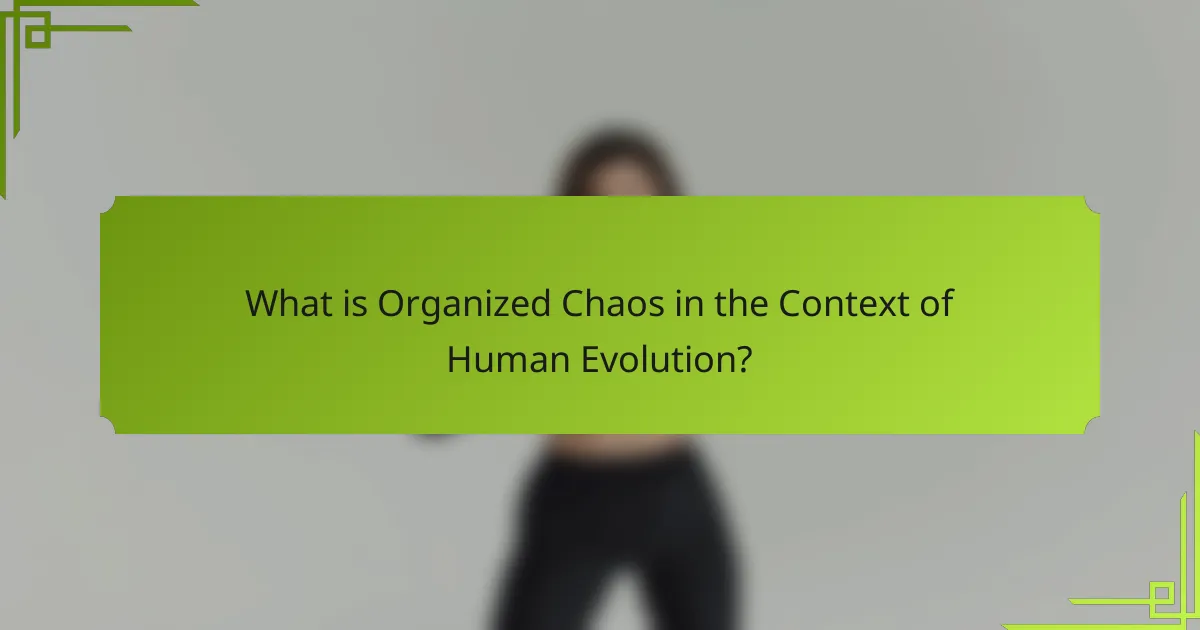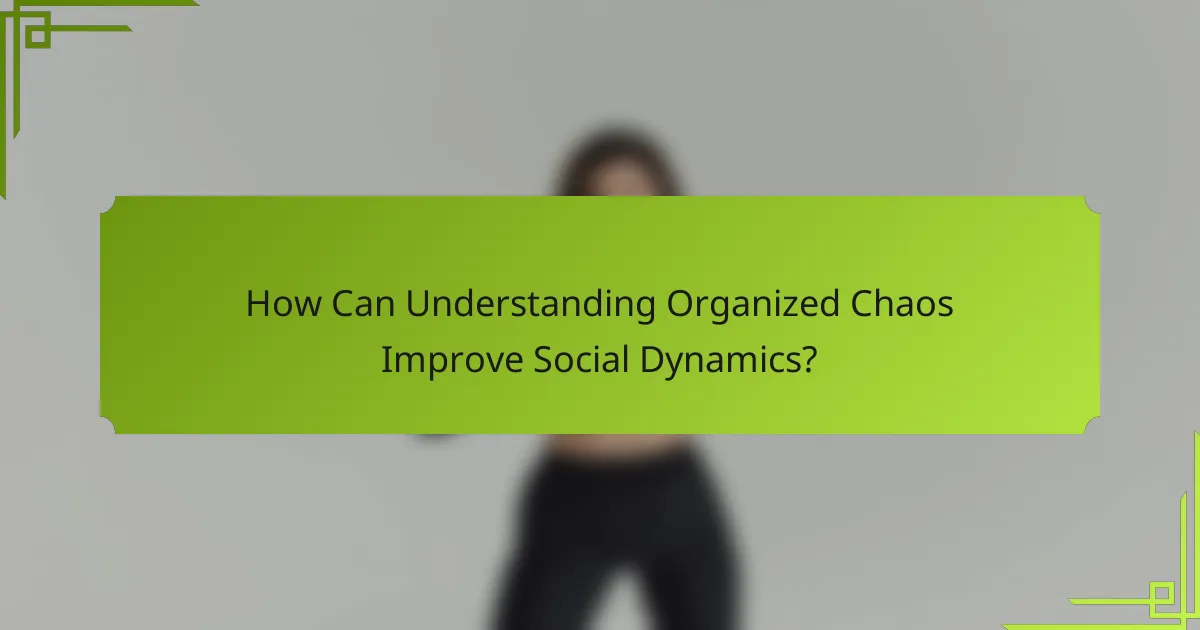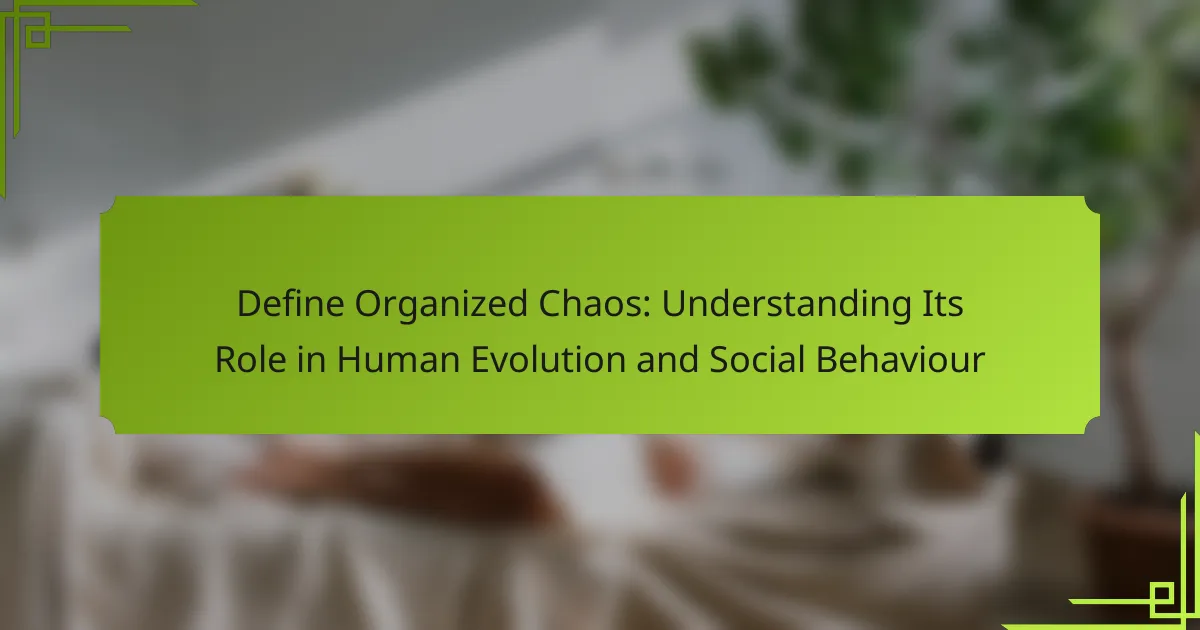Organized chaos is essential for understanding human evolution and social behaviour. It highlights how early humans adapted to unpredictable environments, fostering creativity and resilience. This concept explains the emergence of social structures that encourage collaboration and innovation. Additionally, it emphasizes the importance of navigating complex social dynamics to enhance group cohesion and adaptability.

What is Organized Chaos in the Context of Human Evolution?
Organized chaos refers to the complex interplay of unpredictable elements that have shaped human evolution and social behaviour. This concept illustrates how early humans adapted to chaotic environments, fostering creativity and resilience. Social structures emerged from this dynamic, allowing for collaboration and innovation. The ability to thrive amid chaos is a unique attribute of human evolution, influencing cultural and technological advancements. As a result, organized chaos has played a critical role in shaping societies and enhancing survival strategies.
How Does Organized Chaos Influence Social Behaviour?
Organized chaos fosters adaptability and creativity in social behaviour. It encourages individuals to navigate uncertainty, enhancing problem-solving skills. This dynamic environment can lead to innovative collaboration and diverse perspectives. As a result, social cohesion may strengthen through shared experiences in chaotic settings.
What Are the Psychological Mechanisms Behind Organized Chaos?
Organized chaos involves complex systems where disorder leads to adaptive behaviours. It enhances creativity and problem-solving, crucial for human evolution and social dynamics. Psychological mechanisms include cognitive flexibility, allowing individuals to navigate uncertainty and innovate. This adaptability fosters collaboration and resilience in social groups.
What Role Does Cognitive Flexibility Play?
Cognitive flexibility is crucial for adapting to changing environments and social dynamics. It enables individuals to switch perspectives, think creatively, and solve problems effectively. This adaptability has evolutionary benefits, enhancing survival by allowing humans to navigate complex social interactions and unpredictable circumstances.
How Does Stress Response Shape Our Interaction with Chaos?
Stress response influences how we navigate chaos by activating survival instincts. This reaction enhances adaptability, allowing humans to thrive in unpredictable environments. Organized chaos, characterised by structured disorder, played a crucial role in human evolution. It fostered social behaviours like cooperation and communication, essential for group survival. As a result, individuals learn to manage stress, improving their interactions with chaotic situations. This ability to adapt is vital for personal and societal development, shaping our responses to challenges.
What Are the Universal Attributes of Organized Chaos?
The universal attributes of organized chaos include adaptability, creativity, unpredictability, and resilience. These attributes facilitate human evolution and social behaviour by promoting innovative problem-solving and flexibility in dynamic environments. Adaptability allows individuals and groups to respond effectively to changing circumstances. Creativity fosters new ideas and solutions, while unpredictability challenges established norms, encouraging growth. Resilience helps communities withstand and recover from disruptions, reinforcing social bonds and cooperation.
How Is Adaptability a Key Feature?
Adaptability is crucial in organized chaos as it enables individuals and societies to thrive amidst uncertainty. This feature facilitates rapid response to changing environments, enhancing survival and social cohesion. Adaptability allows for diverse problem-solving approaches, fostering innovation. In human evolution, this trait has led to the development of complex social structures, enabling collaborative efforts in unpredictable circumstances.
What Social Cohesion Benefits Arise from Embracing Chaos?
Embracing chaos can enhance social cohesion by fostering adaptability, creativity, and collaboration. Organized chaos encourages diverse perspectives, leading to innovative solutions and stronger community bonds. This dynamic environment cultivates resilience, enabling groups to navigate challenges effectively. As a result, social networks become more interconnected and supportive.
What Unique Attributes Distinguish Organized Chaos?
Organized chaos is distinguished by its unique attributes of adaptability, creativity, and emergent order. These characteristics enable groups to thrive in unpredictable environments, fostering innovation and resilience. Adaptability allows for flexible responses to challenges, while creativity sparks novel solutions. Emergent order arises from decentralised decision-making, leading to effective collaboration.
How Does Contextual Variability Affect Perceptions of Chaos?
Contextual variability significantly influences perceptions of chaos by shaping how individuals interpret and respond to disordered situations. This variability can arise from personal experiences, cultural backgrounds, and environmental factors. For example, a chaotic environment may be perceived as stressful in one context but as stimulating in another. Understanding organized chaos highlights its adaptive role in human evolution and social behaviour, allowing for flexibility and creativity in navigating complex challenges. This duality illustrates that perceptions of chaos are not fixed but rather fluid, influenced by situational contexts and individual perspectives.
What Are the Cultural Influences on Acceptance of Chaos?
Cultural influences on acceptance of chaos vary widely across societies. These influences shape perceptions, behaviours, and responses to disorder. For instance, cultures that value collectivism may view chaos as an opportunity for community bonding, while individualistic cultures might see it as a threat to personal autonomy. Historical events also play a role; societies that have experienced significant upheaval may develop resilience towards chaos, fostering acceptance. Furthermore, art and literature often reflect and challenge societal norms regarding chaos, influencing public sentiment and acceptance levels.
What Rare Attributes Can Be Observed in Organized Chaos?
Organized chaos exhibits rare attributes such as adaptability, innovation, and resilience. These characteristics emerge from the complex interplay of social dynamics and environmental challenges. Adaptability allows individuals and groups to thrive in unpredictable situations. Innovation fosters creative solutions and novel approaches to problems. Resilience helps communities recover and grow stronger after disruptions. Understanding these rare attributes enhances our insight into human evolution and social behaviour.
How Do Extreme Situations Foster Creative Solutions?
Extreme situations often stimulate innovative thinking, leading to creative solutions. Stressful environments can push individuals to think outside conventional frameworks, fostering adaptability and resourcefulness. Historical examples illustrate how crises have sparked significant advancements in technology and social structures. For instance, the rapid development of medical technologies during pandemics showcases human ingenuity under pressure.
What Is the Impact of Organized Chaos on Innovation?
Organized chaos fosters innovation by encouraging creativity and adaptability. It allows diverse ideas to merge, leading to unique solutions. This dynamic environment can enhance problem-solving and drive progress. By embracing uncertainty, organisations can unlock potential and stimulate growth.

How Can Understanding Organized Chaos Improve Social Dynamics?
Understanding organized chaos can enhance social dynamics by fostering creativity and adaptability. It allows individuals to navigate complex social structures, encouraging collaboration and innovation. Organized chaos promotes resilience, enabling groups to respond effectively to challenges. This dynamic can lead to improved communication and stronger interpersonal relationships, ultimately enhancing group cohesion.
What Practical Strategies Can Be Implemented to Harness Organized Chaos?
Implementing practical strategies to harness organized chaos involves embracing flexibility and adaptability. Encourage innovation by allowing team members to explore diverse ideas and solutions. Foster a culture of open communication to enhance collaboration and creativity. Utilize technology to streamline workflows and manage tasks effectively, ensuring that chaos becomes an opportunity for growth. Prioritise a balance between structure and spontaneity, enabling teams to thrive in dynamic environments.
What Common Mistakes Should Be Avoided When Navigating Chaos?
To navigate chaos effectively, avoid common mistakes such as overreacting to stress, failing to prioritise tasks, and neglecting self-care. Embracing organized chaos can enhance adaptability and innovation. Recognise that chaos can stimulate creativity, but balance it with structure to prevent overwhelm. Focus on clear communication to align goals and expectations, ensuring everyone involved can respond effectively.
What Expert Insights Can Guide Our Understanding of Organized Chaos?
Expert insights reveal that organized chaos plays a crucial role in human evolution and social behaviour by fostering adaptability and innovation. This concept highlights how seemingly disordered environments can stimulate creativity and problem-solving. Research indicates that chaotic conditions, when managed effectively, can lead to increased collaboration and diverse perspectives, essential for societal progress. Furthermore, organized chaos encourages resilience, allowing individuals and groups to navigate complex challenges. Understanding this interplay enhances our comprehension of human dynamics in various contexts, from workplaces to social movements.
